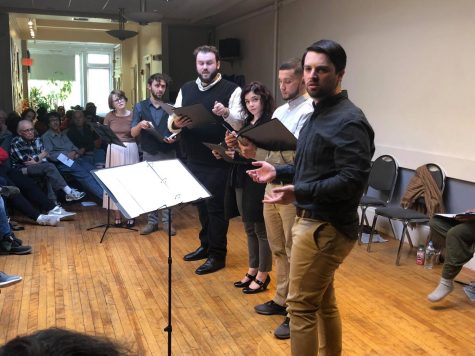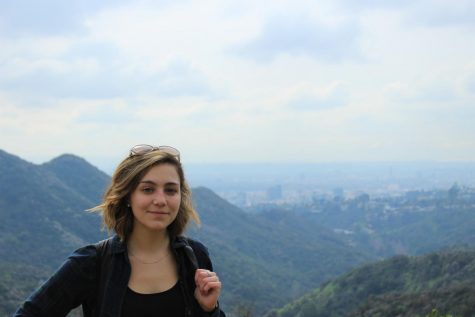From the extermination of nearly six million Jews during the Holocaust, to the tremendous bloodshed resulting from the Israeli Palestinian conflict, a pattern of oppression has fueled global conflicts for centuries.

Cast of “Kafka in Palestine”
Written by Northeastern professor Emerita Inez Hedges and directed by Morgan Flynn, the imaginatively crafted play “Kafka in Palestine” integrates critical messages about human rights through the eyes of Bohemian Jewish novelist Franz Kafka during the 20th century.
“This kind of play is a new form of communities education,” said Hedges in an interview with The Suffolk Journal. “These plays are not for entertainment, they are meant to encourage discussion about important issues.”
This past Sunday, dozens gathered at the Community Church of Boston for a staged reading of “Kafka in Palestine” as a part of the church’s Sunday Service Speaker’s Forum. Using a unique, confrontational style of storytelling, Hedges’ play portrays the relationship between Franz Kafka, played by Benjamin Finn, and his sister Ottla, played by Shannon Keelan.
“Sometimes I feel like I’ve never belonged anywhere,” said Kafka during the play reading. Kafka and Ottla, both Jews, were raised in Prague. However, their predominantly German lifestyle creates conflict within their Jewish identity.
The play follows the lives of Kafka and his sister before World War II as they dream of escaping their domineering father. Drawing inspiration from the works of Austro-Hungarian writer Theodore Herzl, played by Alex Deroo, Kafka and Ottla imagine moving to the land of Palestine. The two hope they will be able to embrace their true Jewish identity in a land among other Jews.
In the first scene, Kafka meets Herzl at a coffee shop in Vienna prior to the start of World War II where they discuss the oppression facing Jews. Kafka and Herzl elaborate on the impact of war on their society – both on a societal and personal level.
“Someday, we Jews will have our own national identity,” said Herzl’s character. Kafka’s character mentions the “absurd glorification of war,” emphasizing that their existence is within “a world of demons.”
Hedges draws profound parallels between the injustice of the early 20th century alongside that of modern society. She depicts the unwavering oppression facing Jews leading up to World War II in comparison to the brutality within the Israeli Palestinian conflict today.
“We must get approval for the homeland now before it is too late,” said Herzl. Hedges refers to Palestine as the homeland, insinuating that the Israeli Palestinian conflict of the modern world has yet to provide a concrete Jewish homeland for almost a century.
To express both the creative and nightmarish mind of Kafka in the play, Hedges incorporates the “inner demon” that Kafka often wrote about in his novels. This inner demon, played by Genevieve Inez McCarthy, takes shape in the play as a mole and provides insight into Kafka’s deep thoughts.
The second half of the play takes place in the modern world within the land of Palestine. Although Kafka died from tuberculosis and Ottla was killed after being sentenced to the Terezin concentration camp, Hedges magically reunites the spirits of both characters within the current scene of the Israeli Palestinian conflict.
Together, Kafka and Ottla analyze the current oppression and discrimination that has been provoked within the land they once dreamed would be free from the judgment and resistance they were originally fleeing.
“Look around you, isn’t this the result of all our nightmares?” Ottla’s character asked as she looked out over modern-day Palestine. “As long as there are excluded people, we are them too.”
Despite their hopes of peace for the future, Ottla and Kafka are dismayed by the walls being built around Palestinian territory and the tremendous difficulty of the immigration process.
In the final scene of the play, Kafka and Ottla take shape as migrants attempting to return to the home they once owned within current Palestinian land. They face harsh scrutiny and are told that by previously leaving, they gave up their right to the land that once belonged to them.
After waiting for hours in a line to cross the checkpoint to Palestine, they are told that the checkpoint is no longer allowing migrants to enter and that they should go home.
In response, the play concludes with Kafka and Ottla asking the powerful question, “Home, where is home?” Hedges’ play illustrates this significant message of oppression and displacement as the main takeaway from the performance.
“This play was trying to put a mirror to the misjustice that happened to Jews and how it relates to the Palestinians today,” said Keelan, the actress playing Ottla, in a question and answer session with the audience after the play.
By including movement and action among characters within the play reading, Hedges brought to life the heart of the Israel Palestine conflict. With the help of Flynn as the director, Hedges felt the play embodied difficult issues in an understandable and moving way.
“The story really comes to life if you can see snapshots of placement,” said Flynn in an interview with The Journal. “We were able to bring the stories of Kafka to life within the story.”
With the prevalence of oppression and immigration in the modern era, Flynn and Hedges thought it was extremely important for the play to be heard now. By adopting theatre as the form to communicate these issues, the play was able to reach a broader audience.
“This form of theatre is an accessible vehicle for people to hear about issues they have not already heard about,” said Flynn.
Not only is the Israeli Palestinian conflict a current event, the play underlines just how long the struggle of intolerance has been going on and how much worse it has gotten.
“Theatre for social change is essential,” said Flynn. “When that story has a political, social or moral core it has even more purpose to be told.”













